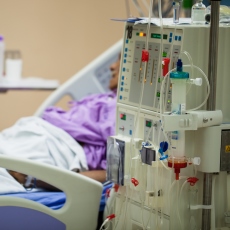
Healthy kidneys clean your blood by removing excess fluid, minerals, and wastes. They also make hormones that keep your bones strong and your blood healthy. But if the kidneys are damaged, they don't work properly. Harmful wastes can build up in your body. Your blood pressure may rise. Your body may retain excess fluid and not make enough red blood cells. This is called kidney failure.
If your kidneys fail, you need treatment to replace the work they normally do. The treatment options are dialysis or a kidney transplant. Each treatment has benefits and drawbacks. No matter which treatment you choose, you'll need to make some changes in your life, including how you eat and plan your activities. But with the help of health care providers, family, and friends, most people with kidney failure can lead full and active lives.
- Kidney Failure (National Library of Medicine)... make enough red blood cells. This is called kidney failure. If your kidneys fail, you need treatment to ... care providers, family, and friends, most people with kidney failure can lead full and active lives. NIH: National ...
- ... damage How well you take care of yourself Kidney failure is the last stage of CKD. This is when your kidneys can no longer support our body's needs. Your ...
- ... www.niddk.nih.gov/health-information/kidney-disease/kidney-failure/hemodialysis . Updated January 2018. Accessed September 11, 2023. ...
- ... www.niddk.nih.gov/health-information/kidney-disease/kidney-failure/hemodialysis . Updated January 2018. Accessed September 11, 2023. ...
- Acute kidney failure is the rapid (less than 2 days) loss of your kidneys' ability to remove waste and help ... Symptoms of acute kidney failure may include any of the following: Blood in the stools Blood in the urine Breath odor and metallic taste ...
- Kidney Failure, End-Stage Renal Disease (ESRD) (American Kidney Fund)Learn about Kidney failure, also called end-stage renal disease (ESRD) or end-stage kidney disease (ESKD), including symptoms, causes and life expectancy ...
- Choosing a Treatment for Kidney Failure

 (National Institute of Diabetes and Digestive and Kidney Diseases) Kidney Failure/Treatments and Therapies ... Kidney Failure ... Easy-to-Read ... From the National Institutes of Health ... National Institute of Diabetes and Digestive and ...
(National Institute of Diabetes and Digestive and Kidney Diseases) Kidney Failure/Treatments and Therapies ... Kidney Failure ... Easy-to-Read ... From the National Institutes of Health ... National Institute of Diabetes and Digestive and ... - Kidney Failure (American College of Radiology) (Radiological Society of North America)Kidney Failure/Diagnosis and Tests ... Kidney Failure ... Current and accurate information about kidney (renal) failure. Learn how doctors diagnose, evaluate and ...
- Dialysis treats end-stage kidney disease also called kidney failure. It removes waste from your blood when your ... Kidney failure is the last stage of long-term chronic kidney disease. This is when your kidneys can ...
- Diabetic Kidney Problems (National Library of Medicine)... fact, diabetes is the most common cause of kidney failure in the United States. People with kidney failure need either dialysis or a kidney transplant. You ...



